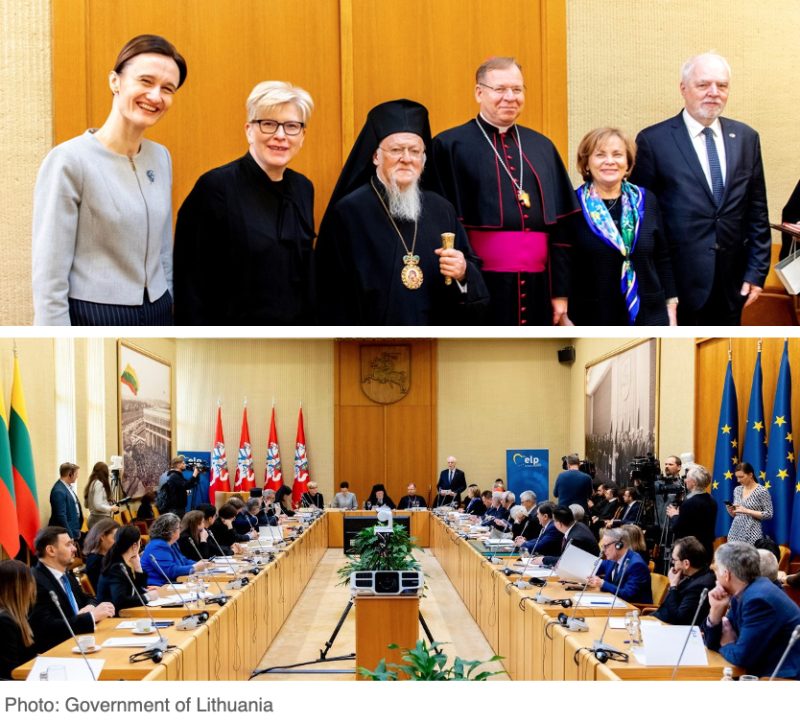In an extensive address in Vilnius, during the meeting organised by the European People’s Party’s Working Group on Interreligious Dialogue and in the presence of Ecumenical Patriarch Bartholomew, Archbishop Gintaras Grušas, President of the Council of the European Bishops’ Conferences, relaunched the requirement for ecumenical commitment to overcome divisions and work towards reconciliation on the continent. He emphasised that this commitment can also be decisive in resolving the war in Ukraine.
“If Christians were united – said the Archbishop of Vilnius – there could be no proclamations of just wars, but there would only be the justice of peace. If Christians were united, Europe itself would be more cohesive, rooted in those Christian values that the world wants to deny, but which are present and alive in every European nation”.
The speech by the CCEE President was, together with that of Patriarch Bartholomew, one of two special interventions that kicked off the debate organised in Vilnius on the occasion of the visit of the Ecumenical Patriarch of Constantinople on 22 March. The event was hosted by the Lithuanian Government.
In his discourse, Archbishop Grušas emphasised that Russia’s large-scale aggression against Ukraine, which began on 24 February 2022, has placed the continent’s Christians in an entirely new situation.
They are aware on the one hand that “peace is not simply the absence of war”, but it also requires lived communion with our neighbours, which is achieved only “through forgiveness and reconciliation”, and on the other hand that “the atrocities that we witness” (from children separated from their families to orphaned children and child victims of the conflict in total) “challenge us each day”.
The CCEE President noted that we are faced with “a new kind of war”, a hybrid war, which is made up of many factors, but which “is not, nor can it ever be, is a religious war”. For this reason, the archbishop said he was concerned about the belligerent homilies of Patriarch Kirill of Moscow and noted that the patriarch’s own position contrasts with that of the sister Churches, thus creating a further problem for ecumenism. He also remarked how Pope Francis himself, from the very beginning of the conflict, has emphasised that “God is only the God of peace, he is not the God of war, and those who support violence profane his name”.
In particular, Grušas recalled how the document “For the Life of the World. Toward a social ethos of the Orthodox Church”, a first compendium of social doctrine born in the Orthodox world, recognises the need for individuals, societies and States to defend themselves without going so far as to define a systematic doctrine of just war.
Catholic social doctrine, on the other hand, even goes so far as to define to what extent defence is permissible, which leads to the idea of a “social doctrine that integrates the Orthodox approach and the Catholic approach”.
At the same time, he pointed out that there was, as a response to the conflict, an “ecumenism of charity” that went beyond divisions and was a sign that “today more than ever, Christian unity is a fundamental goal in order to ensure true unity of Europeans”.
Archbishop Grušas therefore emphasised that any reflection must start from the common faith in Jesus Christ, because “in Jesus, who is the way, the truth and the life, differences are healed. It is in the spreading of his word that we find the strength to reconcile even with our enemies, and to build, amidst a thousand difficulties, a more just world”. And he concluded: “in Jesus we understand the profound dignity of the human being, and with Jesus we know that no war can be the solution – what we need is conversion of hearts and reconciliation”.
For his part, Patriarch Bartholomew recalled that “the Bible teaches that love and peaceful coexistence between peoples are the key to joy and divine life” and that “the Bible itself reminds us that our love for others is a reflection of our love for God, and that we cannot know Him without first showing love and compassion towards other human beings”.
The Lithuanian Prime Minister, Ingrida Šimonytė, highlighted how “the war in Ukraine has also brought to light the incredible capacity for compassion and love that exists in human beings”.
The meeting was organised by the Vice-President of the European People’s Party Group, Rasa Juknevičienė, the Lithuanian Government and the Working Group on Intercultural and Interreligious Dialogue of the European People’s Party.
Attached is the text of the intervention.

